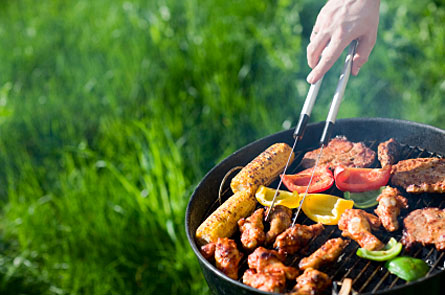Better BBQ through chemistry
A few timely tips for late-summer grilling
WASHINGTON — As summer winds to a close, backyard grillers may be looking back on their last barbecue and asking some rather pointed questions: Why was the grilled chicken so dry? Does eating charred meat really cause cancer? Why did Uncle Fred pucker and cringe after each sip of beer?

Answers to these posers, and others, come courtesy of the American Chemical Society, which as part of its semiannual meeting staged a chemistry-themed barbecue reception August 17 for reporters and other guests. A good time was had by all — even, remarkably, by those who tried the barbecued tofu.
“You can take any food you want and cook it on a grill,” said Sara Risch, a food chemist and consultant based in East Lansing, Mich. “Even vegetables.”
Cooking is as much a science as an art, so understanding the chemistry that happens on the grill helps ensure barbecue success. The heat of a fire triggers “browning reactions” in which amino acids and sugars — either those already present in the food or those added via sauces or marinades — combine to yield the color change that signals a dish is done. But grill something for too long or at too high a temperature, she noted, and the end result is the dreaded “blackening” reaction.
“Unfortunately, if you ask the [food] safety people they’ll tell you to cremate everything,” said Shirley Corriher, a food chemist and cookbook author from Atlanta. Meats should be cooked long enough to kill bacteria, she noted, but they don’t need to be cooked beyond medium to be truly safe. For one thing, carcinogenic chemicals called heterocyclic amines form when creatine — a substance found in muscle tissue — reacts at high temperatures with amino acids, the building blocks of proteins. The amount of HCAs formed in grilled meats typically triples if meats are cooked well done rather than medium well, she noted.
Other research-proven tricks for reducing HCAs, as noted in the Journal of Agricultural and Food Chemistry, include using marinades, garlic and onion, said Risch. A marinade of red wine, for instance, can reduce the formation of HCAs by 88 percent, she noted. Although scientists aren’t sure exactly how these techniques work, moisture from marinades may ensure that the meat directly in contact with the grill remains at a relatively low temperature, she said.
Understanding how the human sense of taste operates can help hosts pick the right thirst quencher to accompany their barbecue. Just as food changes the way wine tastes, one bite of food affects how the next mouthful tastes, said Corriher. Salt tends to suppress bitterness. Similarly, eating or drinking something sweet intensifies the taste of the next mouthful. So, she noted, serving a bitter beer with food swaddled in a sweet barbecue sauce might not work out too well.
To maintain meat’s moisture, grillers can marinate it in a mildly salty solution, said Corriher. One reliable recipe for brine — good for barbecue but also good for presoaking a Thanksgiving turkey — includes 1 cup of salt for each gallon of water. Chemical reactions between the salt and some proteins in meat cause the proteins to unfold and absorb water more effectively. While unbrined meat may lose up to 30 percent of its moisture during cooking, meat marinated in brine can lose as little as 15 percent. “Just be sure to rinse the meat before you cook it,” she warned.
The flavor chemistry of barbecue varies from region to region. One of the biggest debates among barbecue connoisseurs, for example, involves sauce. Across large swaths of the Midwest, cooks prefer ketchup-based sauces. But in some locales, such as North Carolina, people mix sauces using only vinegar, salt and pepper “and they think it’s an outrage to do anything else,” Corriher said. In some parts of the Southeast, heaven forfend, grillers add mustard to their barbecue sauces.
During the question-and-answer session after their presentations, both Risch and Corriher proclaimed a preference for ketchup-based sauces. When pressed on the issue, however, neither could cite any scientific studies bolstering the notion that people who favor ketchup-based sauces have, as a group, slightly higher IQs than those who prefer vinegar-based sauces.







